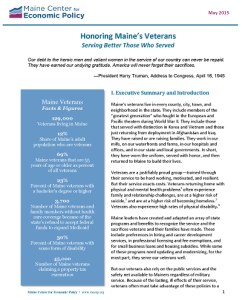MECEP released a new report, Honoring Maine’s Veterans:Serving Better Those Who Served, on May 7,2015. MECEP graduate intern and Iraq war veteran Hal Brewster served as the report’s lead author. The report presents findings from research and analysis of the state programs and services Maine provides to its 129,000 veterans. It recommends five policy changes to improve access, eligibility, and benefit levels for health care, nutrition assistance, higher education, and housing support for our veterans.
For a PDF, of this executive summary of the report, click here.
For a PDF of the full report, click here.
Maine’s veterans live in every county, city, town, and neighborhood in the state. They include members of the “greatest generation” who fought in the European and Pacific theaters during World War II. They include those that served with distinction in Korea and Vietnam and those just returning from deployment in Afghanistan and Iraq. They have raised or are raising families. They work in our mills, on our waterfronts and farms, in our hospitals and offices, and in our state and local governments. In short, they have worn the uniform, served with honor, and then returned to Maine to build their lives.
Veterans are a justifiably proud group—trained through their service to be hard working, motivated, and resilient. But their service exacts costs. Veterans returning home with physical and mental health problems[i] often experience family and relationship challenges, are at a higher risk of suicide,[ii] and are at a higher risk of becoming homeless.[iii] Veterans also experience high rates of physical disability.[iv]
Maine leaders have created and adapted an array of state programs and benefits to recognize the service and the sacrifices veterans and their families have made. These include preferences in hiring and career development services, in professional licensing and fee exemptions, and for small business loans and housing subsidies. While some of these programs need updating and modernizing, for the most part, they serve our veterans well.
But our veterans also rely on the public services and the safety net available to Mainers regardless of military service. Because of the lasting, ill effects of their service, veterans often must take advantage of these policies to a greater extent than their nonveteran counterparts. Simply put, policy changes that determine access, eligibility, and benefit levels for health care, nutrition assistance, higher education, housing support, and other essential services affect our veterans too. This is especially the case for our most vulnerable, disabled veterans and those veterans who live in rural parts of the state.
Despite the honors society accords veterans, they remain a group requiring policymakers’ considered and targeted attention―both to ensure that state programs are responsive and innovative, and to protect federal anti-poverty programs that benefit veterans in Maine.
Recommendations
- Accept federal funds to expand Medicaid under the Affordable Care Act to support Maine veterans and their families who have no health insurance.
- Waive the work requirement for Supplemental Nutrition Assistance Program (SNAP) recipients to keep Maine veterans food secure, especially those struggling to find jobs in Maine’s high-unemployment rural areas.
- Adjust university-level credit transfer policies and provide state appropriations to fully fund the state National Guard Education Assistance Program to improve the rate of Maine veterans with bachelor’s degrees.
- Increase the Property Tax Fairness Credit cap from $600 to $900 for all veterans to help elder veterans stay in their homes, encourage younger veterans to buy homes, and support veteran renters.
- Modernize and streamline Maine’s veterans’ program administration to enable veterans to access more information and services over the Internet and to more closely mirror military operations.
Hal Brewster received a law degree from the Georgetown University Law Center while pursuing a master’s in public affairs from Princeton University. He served in the U.S. Army’s First Infantry Division based in Fort Riley, Kansas. Hal deployed to Iraq where he served first as an intelligence officer and later as a scout and sniper platoon leader. He left active duty in 2010 with the rank of captain.
[i] Mental Health Advisory Team (MHAT) IV, Operation Iraqi Freedom 05-07, Final Report, November 17, 2006. Available at:http://www.combatreform.org/MHAT_IV_Report_17NOV06.pdf.
[ii]Hargarten, Jeff. The Center for Public Integrity. Suicide rate for veterans far exceeds that of civilian population, August 30, 2013. Available at: http://www.publicintegrity.org/2013/08/30/13292/suicide-rate-veterans-far-exceeds-civilian-population.
[iii] National Center on Homelessness among Veterans, U.S. Department of Veterans Affairs. Prevalence and Risk of Homelessness among U.S. Veterans: A Multisite Investigation, August 2011, p. 23. Available at: http://www.va.gov/HOMELESS/docs/Center/Prevalence_Final.pdf.
[iv] U.S. Census Bureau. 2013 American Community Survey using American FactFinder, “Veteran Status, Maine.” Generated October 28, 2014. Available at: http://factfinder2.census.gov/faces/tableservices/jsf/pages/productview.xhtml?pid=ACS_13_1YR_S2101&prodType=table.



